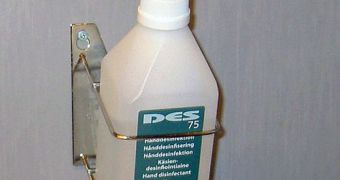If you use an alcohol-based hand sanitizer at home, and you do so frequently, it may be a good idea to read this before getting behind the wheel. Researchers have recently shown that alcohol in these substances can show up in urine tests meant to gage alcohol consumption.
The chemical doesn't have any influence on the brain, in the sense that no one will ever feel inebriated from washing their hands with this type of soap. But authorities who make people take such tests usually don't take kindly of positive results.
Investigators from the University of Florida College of Medicine (UFCM) recently conducted a series of experiments to test this link. During the survey, 11 volunteers applied Purell, a popular brand of hand sanitizer, to their hands for three days.
Before the study began, the group had not consumed alcohol for 5 days. Then they began applying the soap on their hands once every 5 minutes for about 10 hours a day. They kept this up for 72 hours.
The company manufacturing Purell claims that 62 percent of its product is ethyl alcohol. When researchers analyzed participants' urine at the end of first day, they found compounds created by the breakdown of alcohol in 8 of the 11 samples.
In any official test, finding these chemicals would be equivalent to the conclusion that the person being tests consumed alcohol recently, My Health News Daily reports. UFCM researchers say that health care professionals should be most concerned about these findings.
Those with a history of drug or alcohol problems are also affected, since their employers frequently ask them to undergo drug or alcohol tests. “We would encourage these individuals to be aware of the myriad sources of alcohol they can come across in daily life,” study researcher Gary Reisfield says.
The UFCM Department of Psychiatry assistant professor says that alcohol contained in products such as aftershave, mouthwash and cough syrup could also add to the amount the body is exposed to from hand sanitizers, and lead to an even more drastic result.
Scientists say that the common alcohol breakdown product ethyl glucuronide was found in the urine of 8 of 11 participants. However, levels of the other trademark compound, called ethyl sulfate, were not found.
This implies that authorities and doctors testing for alcohol use should construe a test result that only shows positive ethyl glucuronide concentrations as belonging to a person who did not actually drink alcohol.

 14 DAY TRIAL //
14 DAY TRIAL //